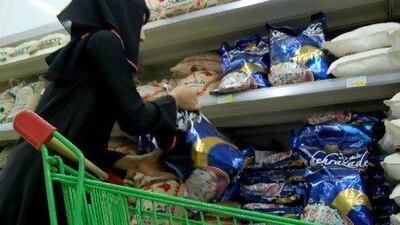WASHINGTON // Bad weather, growing demand and market speculators drove up the price of food in 2010 and the cost may well keep rising, analysts say.
Experts are warning that further food-supply disruptions this year could trigger more price rises around the world and in Arab regions.
Analysts say countries need to develop strategies to dramatically increase global food production to meet the growing challenges of increased demand in developing nations, population growth and global warming.
For now, rice and wheat prices are still below the peaks of 2007-2008, and while Algerians took to the streets on Sunday over rising prices, the unrest has yet to become as widespread as in 2008, when riots erupted in 32 countries. If there are no major supply disruptions this year, the market should stabilise and prices gradually fall.
Much depends, however, on how global food production fares this year. Last year, prices rose when drought and fires caused Russia to suspend its wheat exports.
The floods in Queensland, Australia, are driving prices up, and the country has cut its forecast for sugar and wheat exports. With political instability in some countries in Africa and South America, drought in Argentina and flooding in India and Pakistan, the food market looks volatile and prices are likely to remain high over the next several months.
"Markets behave on news a lot of the time," said Julian Lampietti, programme co-ordinator for agricultural and rural development at the World Bank's Middle East and North Africa division.
Mr Lampietti said last year's food price rise came in part as a response to predictions that yields were going to decline, predictions that did not factor in stocks that had been amassed since the 2008 crisis and that helped mitigate the rise.
Panic buying can dramatically impact prices, affecting poorer countries and those that rely mostly on imported food, such as in the Gulf and Arab countries generally.
The Arab world as a whole imports more than 50 per cent of the calories their populations consume, according to the World Bank. That figure is much higher in the drier Gulf countries, where less water means less domestic agriculture and greater wealth means greater demand.
Experts say there is no easy answer to improving food security in Arab countries absent a comprehensive strategy that not only addresses supply-side issues but also addresses environmental factors to mitigate the effect of climate change and tackles consumer behaviour by providing better nutritional education, family planning and social safety nets.
By 2050, according to a December study by the International Food Policy Research Institute (IFPRI), the price of maize could rise by 42 to 131 per cent, rice by 11 to 78 per cent and wheat by 17 to 67 per cent.
Gerald Nelson, co-author of the report, said: "Only with a comprehensive effort to increase global productivity, developing agriculture in poorer countries, improving infrastructure and technology, increasing water yield and investing in genetically modified crops is it possible to avoid a major food crisis by 2050.
"Beyond that, once you get to 2100, if we don't put some downward pressure on greenhouse-gas emissions so that the temperature increases aren't as great as currently predicted, I am a lot more pessimistic about the ability to deal with this."
The key aim for Gulf countries and others that rely on imported food is to diversify and look at the broader global food infrastructure, said Mr Lampietti.
"Maybe you're better able to address your food security issues by owning the assets that actually handle all the food and being involved in the global trade itself," said Mr Lampietti. "Focusing on supply chains and systems that enable you to bring food into your country in times of crisis is a very good solution. And the idea of owning or buying the biotechnology around the production is another very interesting way [Gulf countries] could use their capital to have more influence on global food markets."
Buying up agricultural land in other countries is valuable as a development strategy, Mr Lampietti said, insofar as it contributes to the development of agriculture in those countries. But in a time of crisis, it might not be of much use.
"Acquiring land in other countries is always an iffy thing," said Mr Nelson. "Because just as the Russians said 'we are going to ban exports of wheat this year because we have a problem', why couldn't Tanzania do that in a crisis, even if the land was owned by the Emirates?"
One of the greatest threats to food price stability generally is export bans such as the ones witnessed last year in Russia and Ukraine.
Last week, Caroline Spelman, the UK's environment minister, said it should be illegal for countries to halt food exports even at times of national crisis.
But multilateral agreements to regulate the international agriculture trade are difficult to reach, and is one of the main reasons the World Trade Organisation's Doha Development Round has reached an impasse. Those talks seek to lower barriers to trade worldwide. They have been stalled since 2008, with agriculture proving one of the most divisive issues.
"The first best thing that Gulf and other countries could do is make sure that the Doha round gets passed," Mr Nelson said. "What that does is it makes it more politically challenging for countries to do what Russia did, which was to ban wheat exports. Countries will do that even if they sign some international agreement, but it makes the political cost of doing so higher."

